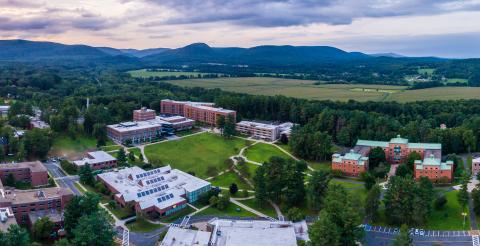Our program is very hands-on and field-oriented. This means that you will need to be prepared to be outside in all sorts of weather and conditions. All first-year students will typically take ENVS 0105 (Natural History and Field Methods) and ENVS 0180 (First Year Seminar). You can expect to be outside for just about every class -- in the rain, in the heat, in the mud, in the cold, in the wind, and perhaps with mosquitoes, ticks, and other annoyances. This is just a reality of our discipline.
Your instructor will discuss what to expect in more detail during the class, but you should be prepared with:
- Field pants. Jeans are fine but lightweight field pants are even better. Whatever you bring WILL get dirty, muddy, and maybe torn. Light colored pants will allow you to see and remove ticks before they bite you and have the potential to transmit tick-borne microbes (like the bacterium that causes Lyme disease). You may want to treat whatever field clothes you bring with permethrin for tick prevention.
- Sturdy boots (waterproof). YouŌĆÖll do a fair amount of hiking in rough brush and uneven terrain. YouŌĆÖll want boots to protect your feet and ankles. If you donŌĆÖt already have a pair, get some and start wearing them around to break them in. You can find decent boots in many stores such as EMS, REI, SAMs, etc. Some folks just use rubber boots, like Muck boots.
- Wool or polyester fleece socks. Those waterproof boots arenŌĆÖt much use if your feet are cold. If you donŌĆÖt already have some, we recommend buying a couple pairs of wool Darntough, Carhartt, or Smartwool boot socks. Wool and polyester fleece are warm when wet, cotton is NOT. Beware ankle socks, youŌĆÖll get blisters wearing these with boots.
- A few tee shirts that can get muddy, dirty, and torn. Some people wear cotton because they like the feel, but you might consider some kind of moisture-wicking polyester shirts.
- Polyester fleece jacket for warmth (NOT a cotton hoodie). Wet cotton is cold, wet polyester fleece is warm. This past year, we ordered departmental fleeces with an embroidered ENVS logo ŌĆō super nice, and just $35 each.
- Rain coat. If it rains during lab youŌĆÖll likely be outside anyway. Your rain coat will also be windproof, so youŌĆÖll be able to make layers with your fleece top. You might consider rain pants as well, but theyŌĆÖre not essential.
- Knit or fleece winter cap. It gets cold here in Western Mass beginning late October / November. Think about gloves, too.
- Optional: ŌĆ£Rite in the RainŌĆØ notebook so that you can take notes outside even when it is raining.
- Optional: Hat to keep rain, sun and bugs off your head. A brimmed hat is best.
- Optional: Bathing suit (mandatory for the Water Resources class that you may eventually take).
Hint: There are a lot of good online sources for outdoor gear. Some folks use , but , , and all have good deals on clothes and clearance pages with even better prices.















